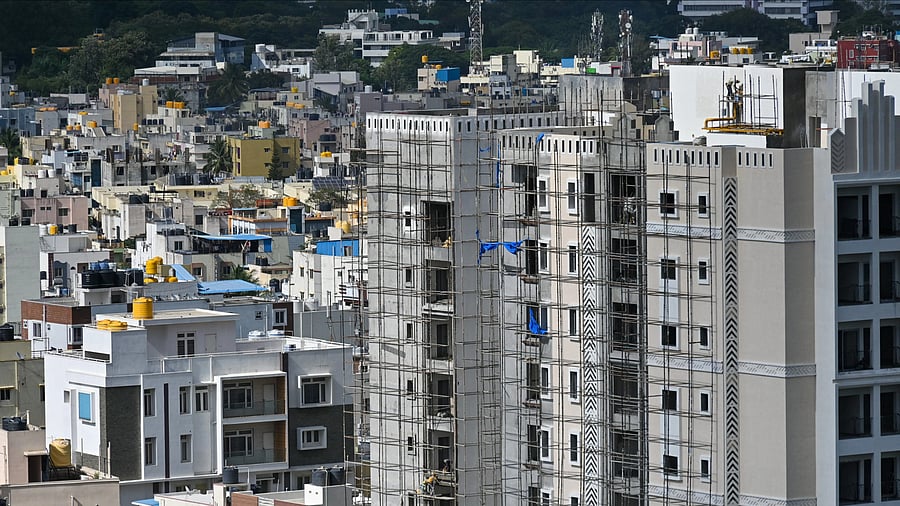
Aerial view of Bengaluru city from BMT Layout area.
Credit: DH PHOTO/PUSHKAR V
In a sweeping move towards digitisation and accountability in property ownership, the Bruhat Bengaluru Mahanagara Palike (BBMP) has made e-Khata mandatory for all property registrations under its jurisdiction from September 30, 2024. This digital transformation aims to eliminate ambiguity, prevent fraud, and increase transparency in Bengaluru’s rapidly evolving real estate landscape.
Importance of e-Khata
The term Khata (meaning “account”) refers to a crucial document maintained by BBMP that records property tax payments and verifies legal ownership. A valid Khata is essential for property registration, securing building permits, obtaining home loans, and entering into legal agreements.
Khatas are broadly classified into two categories:
A-Khata: Issued to properties fully compliant with building by-laws, tax regulations, and zoning norms. These properties have clear titles and are eligible for bank loans and building permits.
B-Khata: Issued for non-compliant or semi-legal properties, such as those with plan deviations, tax arrears, or lacking approvals. While these properties are recorded for tax purposes, they are not eligible for loans or permits and carry significant resale and legal risks. However, B-Khata properties can be upgraded by paying betterment charges and fulfilling required compliances.
To modernise this system, BBMP has introduced e-Khata, the digitised version of the traditional paper-based Khata. Available through Karnataka’s official e-Aasthi or e-Swathu portals, e-Khata provides digital access to ownership records, tax details, and property documents. Offering the same legal status as A-Khata for compliant properties, e-Khata eliminates delays, human errors, and fraud associated with manual processes, creating a more efficient and secure way to manage property ownership.
The new July 2025 rule
Previously, apartment builders would complete construction and obtain an occupancy certificate (OC) from BBMP before registering flats in buyers’ names. After the purchase, buyers were responsible for applying for a Khata (or e-Khata) individually.
However, under the new regulations effective 1 July 2025, builders are required to first register the e-Khata for each flat in their name before transferring it to buyers. This shift places the onus on developers to ensure all properties are digitally recorded and compliant from the outset.
Since launching the digital Khata system in October 2024, the BBMP has already processed and issued approximately 2.75 lakh e-Khatas, according to official data.
The impact
The transition to e-Khata impacts multiple stakeholders across the real estate ecosystem. For buyers, e-Khata is essential for validating ownership, clearing title checks, and securing home loans.
Investors benefit from the legal clarity it provides, simplifying due diligence and helping avoid fraudulent or disputed properties. Landlords rely on e-Khata as official proof of ownership when drafting legally binding rental agreements.
Tenants can use it to verify that the property is legally compliant and free from unauthorized construction. For developers, e-Khata has become mandatory for obtaining building plan approvals starting July 2025, placing the responsibility of compliance firmly on builders before transferring ownership to homebuyers.
The adoption of e-Khata brings several long-term advantages to Bengaluru’s real estate landscape. It ensures transparency by providing public access to ownership and tax records, significantly reducing the risk of manipulation, duplicate claims, or disputes. It enhances efficiency, making transactions such as property sales, leases, and name transfers quicker, more reliable, and less dependent on manual paperwork. As a legally accepted proof of ownership, e-Khata also boosts loan readiness, helping buyers secure financing with minimal delays. Perhaps most importantly, it contributes to overall market hygiene by acting as a filter to identify and eliminate encroached, illegal, or non-compliant properties from formal dealings.
Challenges
Despite its many advantages, the rollout of e-Khata has not been without challenges. One key hurdle is stricter compliance, owners of B-Khata properties must undergo more rigorous scrutiny and fulfill additional requirements before their properties can be converted to e-Khata status. Digital accessibility is another concern, particularly for senior citizens and residents in semi-urban or rural areas who may find it difficult to navigate the fully online process without support. Additionally, administrative backlogs have led to delays in registration, with processing times often stretching between 15 to 30 days due to high application volumes and limited resources.
Government push
To accelerate adoption, Deputy CM D.K. Shivakumar recently launched a door-to-door e-Khata distribution drive in Byatarayanapura constituency. On July 1, the BBMP announced that 25,000 e-Khatas are ready for doorstep delivery, with plans to continue this initiative throughout the month.
In recognition of its impact, the e-Khata system received the Silver Award at the National e-Governance Awards 2024, reinforcing its role as a flagship initiative in digital property governance.
Conclusion
e-Khata is more than a bureaucratic update, it is the foundation for a more accountable, modern, and efficient real estate ecosystem in Karnataka. As the government pushes for full-scale digital adoption, buyers, sellers, and developers must treat e-Khata not as optional, but as essential.
Whether you’re investing, constructing, leasing, or buying, ensuring your property is e-Khata-compliant is no longer just advisable. It’s the law.
(The writer is CEO and Co-founder, NoBroker)